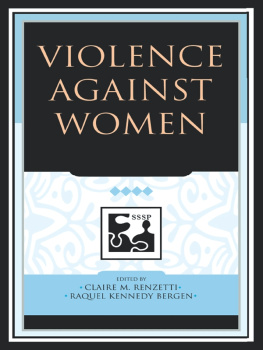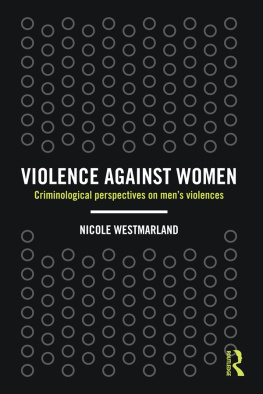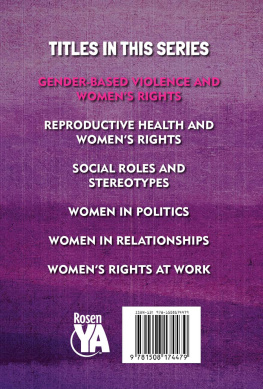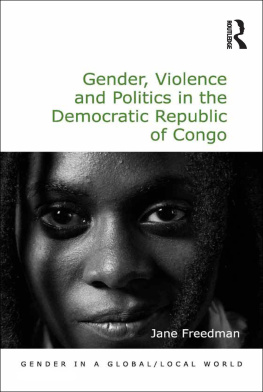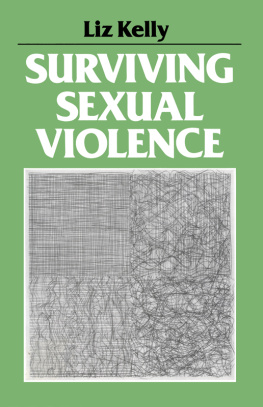
Mens Intrusion, Womens Embodiment
Research on violence against women tends to focus on topics such as sexual assault and intimate partner violence, arguably to the detriment of investigating mens violence and intrusion in womens everyday lives. The reality and possibility of the routine intrusions women experience from men in public space from unwanted comments, to flashing, following and frottage are frequently unaddressed in research, as well as in theoretical and policy-based responses to violence against women. Often at their height during womens adolescence, such practices are commonly dismissed as trivial, relatively harmless expressions of free speech too subjective to be legislated against.
Based on original empirical research, this book is the first of its kind to conduct a feminist phenomenological analysis of the experience for women of mens stranger intrusions in public spaces. It suggests that intrusion from unknown men is a fundamental factor in how women understand and enact their embodied selfhood.
This book is essential reading for academics and students involved in the study of violence against women, feminist philosophy, applied sociology, feminist criminology and gender studies.
F. Vera-Gray is a Research Fellow in the Law School at Durham University, UK, interested in drawing together feminist phenomenological conceptual approaches and empirical research on violence against women and girls.
Routledge Research in Gender and Society
41 Cross-Cultural Women Scholars in Academe
Intergenerational Voices
Edited by Lorri J. Santamara, Gatane Jean-Marie, and Cosette M. Grant
42 Muslim Women, Transnational Feminism and the Ethics of Pedagogy
Contested Imaginaries in Post-9/11 Cultural Practice
Edited by Lisa K. Taylor and Jasmin Zine
43 The Embodied Performance of Gender
Jack Migdalek
44 Gendering Globalization on the Ground
The Limits of Feminized Work for Mexican Womens Empowerment
Gay Young
45 New Dynamics in Female Migration and Integration
Edited by Christiane Timmerman, Marco Martiniello, Andrea Rea and Johan Wets
46 Masculinities and Femininities in Latin Americas Uneven Development
Susan Paulson
47 Gender, Nutrition, and the Human Right to Adequate Food
Toward an Inclusive Framework
Edited by Anne C. Bellows, Flavio L.S. Valente, Stefanie Lemke, and Mara Daniela Nez Burbano de Lara
48 Teaching Womens Studies in Conservative Contexts
Considering Perspectives for an Inclusive Dialogue
Edited by Cantice Greene
49 Ageing, Gender and Sexuality
Equality in Later Life
Sue Westwood
50 Gendering the Memory of Work
Women Workers Narratives
Maria Tamboukou
51 Mens Intrusion, Womens Embodiment
A Critical Analysis of Street Harassment
F. Vera-Gray
52 Neoliberal Bodies and the Gendered Fat Body
Hannele S. Harjunen
Mens Intrusion, Womens Embodiment
A critical analysis of street harassment
F. Vera-Gray
First published 2017
by Routledge
2 Park Square, Milton Park, Abingdon, Oxon OX14 4RN
and by Routledge
711 Third Avenue, New York, NY 10017
Routledge is an imprint of the Taylor & Francis Group, an informa business
2017 F. Vera-Gray
The right of F. Vera-Gray to be identified as author of this work has been asserted by her in accordance with sections 77 and 78 of the Copyright, Designs and Patents Act 1988.
All rights reserved. No part of this book may be reprinted or reproduced or utilised in any form or by any electronic, mechanical, or other means, now known or hereafter invented, including photocopying and recording, or in any information storage or retrieval system, without permission in writing from the publishers.
Trademark notice: Product or corporate names may be trademarks or registered trademarks, and are used only for identification and explanation without intent to infringe.
British Library Cataloguing in Publication Data
A catalogue record for this book is available from the British Library
Library of Congress Cataloging in Publication Data
Names: Vera-Gray, F., author.
Title: Mens intrusion, womens embodiment : a critical analysis of street harassment / F. Vera-Gray.
Description: New York : Routledge, 2016. | Series: Routledge research in gender and society
Identifiers: LCCN 2016004645| ISBN 9781138951594 (hardback) ISBN 9781315668109 (e-book)
Subjects: LCSH: Sexual harassment of women. | Public safety. | Public spacesSocial aspects.
Classification: LCC HQ1237 .V467 2016 | DDC 305.42dc23
LC record available at http://lccn.loc.gov/2016004645
ISBN: 978-1-138-95159-4 (hbk)
ISBN: 978-1-315-66810-9 (ebk)
Typeset in Times New Roman
by Wearset Ltd, Boldon, Tyne and Wear
For my brother,
who would argue with everything in here.
I miss you.
Contents
There is little more exciting and rewarding than participating in the process of a young feminist scholar pursuing their ideas and dreams. For Fiona Vera-Gray this was to connect two passions: philosophy and sexual violence. She was one of the first graduates of the Child and Woman Abuse Studies Units MA at London Metropolitan University: the kind of student that you feel privileged to have in a class, who thinks clearly and fast, draws on practice based knowledge and pushes everyone to further insights and clarifications. I still use the concept she developed in her MA dissertation: describing Rape Crisis Centres as a location for a Whole Place Self. This encapsulates a philosophical approach which positions women as more than what they have endured and survived: that their past, present and potential futures are not determined, albeit changed, by violence and abuse. It is this radical feminist perspective, that womens lives and selves are changed in complex ways by coping with the threat and reality of violence, which formed the foundation of the PhD on which this book is based.
It was a pleasure to supervise her, to travel the process of refining a question and methodological approach, data collection and analysis with a woman who seeks to go deeper, to explore issues in new and revealing ways. One of the specific pleasures has been the ways in which Fiona has drawn on and developed concepts from my work and thinking, some of which I have neglected to write up for publication, but have become key ideas I use in teaching.
The core concept in my PhD was that sexual violence (now probably expressed as mens violence against women) was a continuum, that there was a connection between the mundane everyday intimate intrusions most women and girls experience and the forms of abuse which are considered crimes and worthy of legal intervention. One aspect of the continuum explored in Surviving Sexual Violence was the links between sexual harassment, sexual assault and rape. This book takes that analysis much further, and in the process creates a new concept mens intrusions in public space. By centring womens accounts as the fulcrum for analysis it becomes clear that some intrusions are not sexual or sexualised, and are difficult to name as harassment. Nonetheless women know that something is happening in the interaction that draws on, and attempts to reproduce, gender power relations: men feel entitled to womens attention and this permits them to intrude on our being in the world. We learn this early in our lives, alongside the threat and reality of mens violence.


